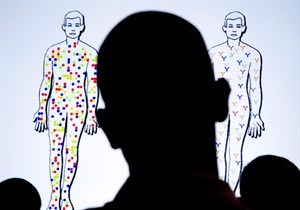
Members of the audience look at slides projected on video screens during the XIX International AIDS Conference, in Washington, July 25, 2012. Anti-retroviral drugs changed HIV from a death sentence to a chronic disease for people who could afford and gain access to the medication. And the effect of that shows: A new study says a 20 year old HIV positive person in North America can expect to live into their early 70s. THE CANADIAN PRESS/AP-Carolyn Kaster
December 18, 2013 - 2:22 PM
TORONTO - A new study suggests the life expectancy of Canadians and Americans who are HIV positive is closing in on that of the general population.
The study says that a 20-year old diagnosed with HIV today can expect to live into their early 70s.
A couple of decades ago, a diagnosis of HIV was a death sentence for most who received it.
But with the discovery and improvement of antiretroviral drugs, HIV has become a chronic disease for most who have access to and can afford the medication.
A leading HIV researcher, Dr. Julio Montaner, says the findings of the study are excellent news.
Montaner is director of the B.C. Centre for Excellence in HIV/AIDS, which led the research collaboration that produced the study, which is published in the journal PLoS One.
He says the longevity gains have been remarkable. In 2000, a 20-year-old newly diagnosed with HIV could expect to live another 36 years. By 2006, that figure had climbed to 51 years.
"I don't think, in all honesty, that there has been an area of medicine that has undergone a revolutionary evolution over our lifetime as HIV has," Montaner says.
Dr. Ann Stewart, medical director of Toronto's Casey House, agrees.
Casey House started 25 years ago as a hospice for dying AIDS patients. As treatment has prolonged the lives of the community it serves, the facility has transitioned into a hospital that offers care for people living with HIV.
Stewart says the findings of the study mirror what Casey House staff see in their patient population. But she warned that the picture is not an "unclouded" one — HIV-positive people often develop the health problems of age faster than those who are not infected.
So heart problems, cancers and the onset of dementia that might be expected in the late 60s, 70s or even 80s in HIV-negative people can show up in the 50s for HIV-positive people, she says.
"It's much better than it was, for sure. For sure. But it's not without challenges," Stewart says.
"You can have HIV and live a wonderful life. But there's certain complications and challenges associated with it as there are with other chronic diseases that you're going to struggle with. So it's not an unclouded sky."
News from © The Canadian Press, 2013